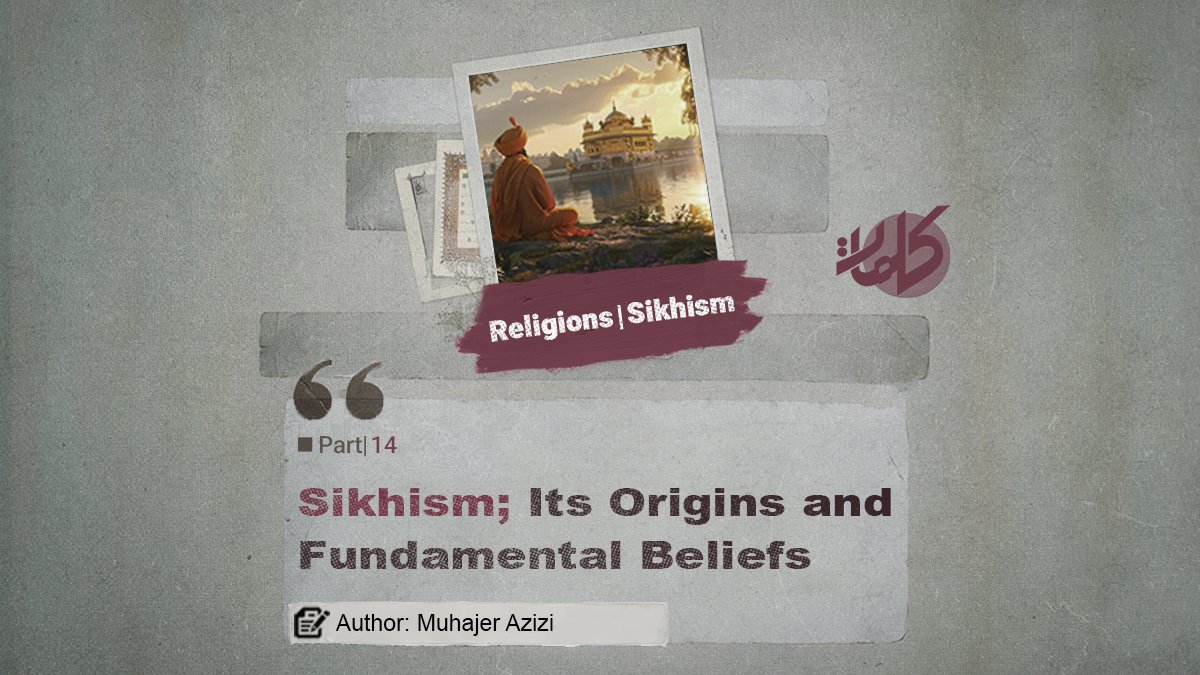Author: Muhajer Azizi
Sikhism; Its Origins and Fundamental Beliefs (Part 14)
3. The Tanziyyah (Deification) of Allah in Sikhism
Sikhism emphasizes monotheism (Tawhid) and prohibits the worship of idols, stars, and trees. From their perspective, God (Allah) has the following characteristics: He never dies; He is formless; His essence is incomprehensible to the human mind; His existence is revealed through His creations.
Sikhs call Allah Almighty by these names:
– “Wah Guru” (God the Master)
– “Sat Nam” (True Name)
– “Kermat” (Giver)
– “Khaliq Haq” (True Creator)
– “Akhal” (Immortal)
– “Nirankar” (Formless and Immaterial)
Sikhism prohibits any depiction or embodiment of God. [1]
Sikhs have been influenced by and learned from Muslims about monotheism; Therefore, they reject idolatry and some superstitions; but in this regard, they have also been influenced by Hinduism, which has led to violation of their monotheism, because the Sikhs were originally a sect of Hinduism.
1. (قُلْ هُوَ اللَّهُ أَحَدٌ) Translation: “Say, He is Allah, the One” [2]
2.(اللَّهُ لَا إِلَٰهَ إِلَّا هُوَ) Translation: “Allah, there is no god but Him” [3]
3. (إِنَّمَا إِلَٰهُكُمْ إِلَٰهٌ وَاحِدٌ) Translation: “indeed, your god is one” [4]
4. (إِنَّ الدِّينَ عِندَ اللَّهِ الْإِسْلَامُ) Translation: “The religion in the sight of Allah is Islam.” [5]
5. (فَمَن يَكْفُرْ بِالتَّاغُوتِ وَيُؤْمِن بِاللّهِ فَقَدِ استْتَمْسَكَ بِالْعُرْوَةِ الْوُطْقَىٰ) Translation: “So whoever disbelieves in the Taghut (false gods) and believes in Allah, he has grasped the most trustworthy handhold.” [6]
Anything that is worshipped other than Allah is called a Taghut; [7]
whether it is a human being, a stone, or any other creature that people have worshipped throughout history. These are all creatures that Allah Almighty created to serve mankind. (يَا أَبَتِ لِمَ تَعْبُدُ مَا لَا يَسْمَعُ وَلَا يُبْصِرُ وَلَا يُغْنِي عَنكَ شَيْئًا) Translation: “Father! Why do you worship that which neither hears nor sees nor avails you anything.[8]
(يَا أَبَتِ لَا تَعْبُدِ الشَّيْطَانَ) Translation: “Father! Do not worship Satan” [9]
Sikhs have also been influenced by Muslims in their belief in the “living God who does not die”, Islam has commanded its followers to believe in this truth. The following Quranic verses are narrated about the life of God (Allah).
1. (اللَّهُ لَا إِلَٰهَ إِلَّا هُوَ الْحَيُّ الْقَيُّومُ) Translation: “Allah, who there is no god but Him, is living and enduring.” [10]
2.(وَعَنَتِ الْوُجُوهُ لِلْحَيِّ الْقَيُّومِ) Translation: “And all forms are submissive to the eternal living.”[11]
3.(هُوَ الْحَيُّ لَا إِلَٰهَ إِلَّا هُوَ فَادْعُوهُ مُخْلِصِينَ لَهُ الدِّينَ) Translation: “He is the Living, there is no god but Him, so call Him with sincerity.” [12]
The Sikh belief that “God has no form” is consistent with the Muslim belief based on the verse: (لَيْسَ كَمِثْلِهِ شَيْءٌ وَهُوَ السَّمِيعُ الْبَصِيرُ) Translation: “There is nothing like Him, and He is the All-Hearing, the All-Seeing”[13] but Tanziyyah in Islam does not mean the negation of existence, because Allah Almighty has an absolute existence. In our belief, the negation and affirmation of divine attributes complement each other and there is no contradiction between them, Allah is not like creatures; but He has perfect attributes such as hearing, sight, and knowledge. Some have not understood this beautiful harmony: some have gone too far in the path of Tanziyyah and, under the pretext of preserving Tanziyyah; They have even denied the divine names and attributes, while others have resorted to personification and analogy in the path of proving the attributes. Both views are false, and we adhere to the words of our Lord: (لَيْسَ كَمِثْلِهِ شَيْءٌ وَهُوَ السَّمِيعُ الْبَصِيرُ) Translation: “There is nothing like Him, and He is the All-Hearing, the All-Seeing” [14]
In this verse, both the denial of similarity to creatures and the proof of attributes (hearing and seeing) are combined with complete wisdom. [15]
5. Attributing indescribability to Allah Almighty
The claim of the followers of the Sikh religion that Allah is “indescribable” is false; rather, Allah Almighty possesses the attributes of perfection and beauty; He is the Creator, the Provider, the Giver, the Merciful, the Giver of Life and the Giver of Death. The Divine Essence is known by the attributes through which His servants can call upon Him and draw near to Him.[16]
Allah the Almighty says in the Holy Quran: (وَلِلَّهِ الْأَسْمَاءُ الْحُسْنَىٰ فَادْعُوهُ بِهَا) Translation: “And to Allah belong the best names, so call upon Him by them.” [17]
The Prophet (peace and blessings of Allah be upon him) also said: «إِنَّ لِلَّهِ تِسْعَةً وَتِسْعِينَ اسْمًا، مِائَةً إِلَّا وَاحِدًا، مَنْ أَحْصَاهَا دَخَلَ الْجَنَّةَ» Translation: “Indeed, Allah has ninety-nine names; one hundred less than one; whoever knows them and uses them will enter Paradise.” [18]
Continues…
Previous Part/ Next Part
References:
1. Ibid, 153.
2. Surah Ikhlas, verse 1.
3. Surah Al-Baqarah, verse 255.
4. Surah Anbiya, verse 108.
5. Surah Al Imran, verse 19.
6. Surah Al-Baqarah, verse 256.
7. Abdul Rahman bin Hassan, Fath al-Majid, p. 392.
8. Surah Maryam, verse 42.
9. Surah Maryam, verse 44.
10. Surah Al-Baqarah, verse 255.
11. Surah Taha, verse 111.
12. Surah Ghafir, verse 65.
13. Surah Shora, verse 11.
14. Shora:11.
15. Bassam Al-Amoush, The Sikh Sect and Islam’s Position on It, p. 152.
16. Ibid, p. 152.
17. Surah Al-A’raf, verse 180.
18. Musnad Ahmad, vol. 12, p. 69.



